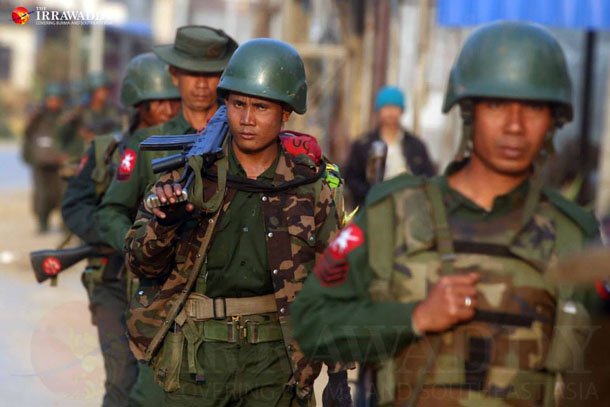Yet another Derailment of the Burma Peace Train
By Burma Partnership • February 16, 2015 For anyone who believes that the peace process in Burma is making progress, the recent escalation and heavy fighting in northern Shan State and Kachin State, as well as the Union Day deed of commitment signing farce, only goes to show that faith in the ability and commitment of the Burma Government to secure a sustainable peace deal is misguided.
For anyone who believes that the peace process in Burma is making progress, the recent escalation and heavy fighting in northern Shan State and Kachin State, as well as the Union Day deed of commitment signing farce, only goes to show that faith in the ability and commitment of the Burma Government to secure a sustainable peace deal is misguided.
Union Day falls on 12 February, and is the anniversary of the Panglong Agreement signed between General Aung San, and Chin, Kachin and Shan ethnic leaders, an agreement that promised autonomy to the ethnic regions. It has been a reference point for ethnic nationalities ever since, and is symbolic of the possibility of a federal union within Burma whereby the rights of ethnic people are protected.
On Union Day this year, President Thein Sein continued to bang the drum of peace, calling for the ethnic armed groups to sign a deed of commitment that pledges support for the peace process. While many ethnic armed groups attended the meeting, only four signed the actual statement, (the Karen National Union, the Democratic Karen Benevolent Army, the Shan State Army – South, and the Karen National Union/Karen National Liberation Army – Peace Council) citing the lack of specific plans for political dialogue. The UN Secretary-General’s Special Advisor on Burma, Vijay Nambiar, called the statement a ‘historic moment.’ This is clearly erroneous. How a vaguely worded statement, that calls for peace and is signed by only four ethnic armed groups while conflict rages throughout northern Shan State and Kachin State, is ‘historic’, is either willfully ignorant of the situation on the ground, or demonstrates a deep misunderstanding of the conflict in Burma.
Meanwhile, in some of the heaviest fighting since the peace process began in 2011, Burma Army and Myanmar National Democratic Alliance Army (MNDAA) engaged in several days of clashes, leaving scores dead from both sides. Tens of thousands of ethnic Kokang have escaped over the border to China, mainly from Laukkai Township, the biggest Kokang town in the area. Laukkai itself has become a ghost town, with reports of looting emerging. Furthermore, clashes are continuing between the Kachin Independence Army (KIA) and the Burma Army in Kachin State near Laiza, while airstrikes have been launched on Ta’ang National Liberation Army (TNLA) and MNDAA areas.
In the context of large scale attacks in the north of the country, the process of signing the deed of commitment is farcical. It is telling that while President Thein Sein signed the document, the Commander-in-Chief of the Armed Forces, Min Aung Hlaing, did not. The deed is practically worthless to conflict-affected communities, and appears to be a public show for the international community, in which Nambiar duly obliged. Yet the protracted conflict and the tension, discord, and distrust that has characterized the peace process should serve as a warning to the relevant peace actors that unless ethnic aspirations are truly met, grievances will not go away, and the structural patterns of unequal rights and a skewed power balance between the center and the periphery will only lead to more violence.
Military domination does not result in sustainable peace. The TNLA was defunct for many years, but regrouped, rearmed and returned to armed resistance because of the failure of the Burma Government and the Burma Army to engage substantively with issues of ethnic equality that have plagued Burma since its formation as a modern nation state. Until the power and the abusive nature of the Burma Army is reined in, until the 2008 Constitution is amended to guarantee equal power to ethnic areas, and until a process of national reconciliation that seeks justice for the victims begins, more people will feel that the only way to protect themselves and their vulnerable communities is through armed resistance.
The international community needs to do all it can to support these ethnic aspirations. Supporting the government’s top-down peace agenda has thus far produced very little, and describing recent meetings as ‘historic’ serves to legitimize a process that has got nowhere in the past four years. Rather, the UN and the international community should be providing necessary resources to assist the victims of the conflict, empower ethnic, community-based civil society, and pressuring the Burma Government to allow aid convoys into conflict-affected areas of Kachin and northern Shan State. In the long term, international actors must engage in meaningful dialogue and consultation with ethnic communities themselves, rather than relying on the words of the former army generals that have recently learned the latest in peace terminology. Because faith in the current, government-led, internationally-sponsored peace process, that is doing more harm than good, is at an all-time low.
Tags: Burma Army, Burma Partnership, Burmese Union Day, Ceasefire ethnic armed groups, General Aung San, Myanmar National Democratic Alliance Army, Panglong Agreement, President Thein SeinThis post is in: Blog
Related Posts21st Century Panglong Conference Reaffirms Obstacles to Peace
Torture, extrajudicial killing, and use of civilians as human shields by Burma Army during new offensive against SSPP/SSA near Upper Yeywa dam site in Kyaukme
Time for a Fresh Start for Genuine Peace
An Open Letter to World Leaders on the Fourth Anniversary of The Resumption of War Calling Urgently for Humanitarian Aid for The Internally Displaced People of Northern Burma
The Burma Government Must Stop Condoning Sexual Violence in Conflict Areas









 All posts
All posts